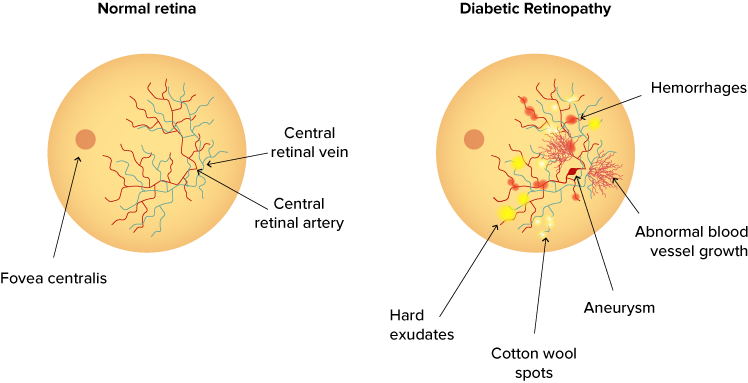Diabetes
This is a medical condition, which causes a person’s blood sugar level to be too high. There are two main types:
Type I Diabetes – The pancreas is responsible for controlling the amount of glucose in the blood. In Type I diabetes the pancreas doesn’t produce enough insulin.
Type II Diabetes – In this type of diabetes the body cells do not react to insulin.

Diabetic Retinopathy
The high blood sugar levels caused by diabetes can damage the retina.
There are four main stages of diabetic retinopathy that your optometrist can examine you for.
- Background retinopathy – In this early stage, the blood vessels on the retina become weak and as a result may leak very tiny amounts of blood. Your vision is normally unlikely to be affected
- Pre-proliferative retinopathy – At this stage, the bleeding from the blood vessels becomes more severe, and the amount of oxygen in the eye reduces. There may also be leakage of fluid, which may affect your vision.
- Proliferative retinopathy – New fragile blood vessels grow due to the reduction in the amount of oxygen in the retina. The older blood vessels scar. These two changes cause more severe vision loss and permanent vision loss is also possible at this stage
- Advanced diabetic retinopathy – The bleeding may go into the gel, (the vitreous) of the eye. This can cause scarring, which can shrink and possibly pull the retina away from the back of the eye, leading to a retinal detachment and loss of vision, which in some cases can be permanent. The macula can also be affected with excess fluid or bleeding around this area, causing rapid vision loss
How to reduce your risk of Diabetic Retinopathy:
- Take regular exercise
- Stop smoking
- Eat healthily
- Check and monitor your blood sugar and cholesterol levels
- Have regular eye tests
- Consult your GP if you notice any symptoms of diabetes
Diabetic Retinopathy treatment
In the first two stages, which include the background and pre-proliferative, treatment may not be required. If the diabetic retinopathy progresses further, laser surgery or surgery on the vitreous may be required.
Diabetics are recommended to have an eye test at least once a year, and are also entitled to free annual eye tests on the NHS.

